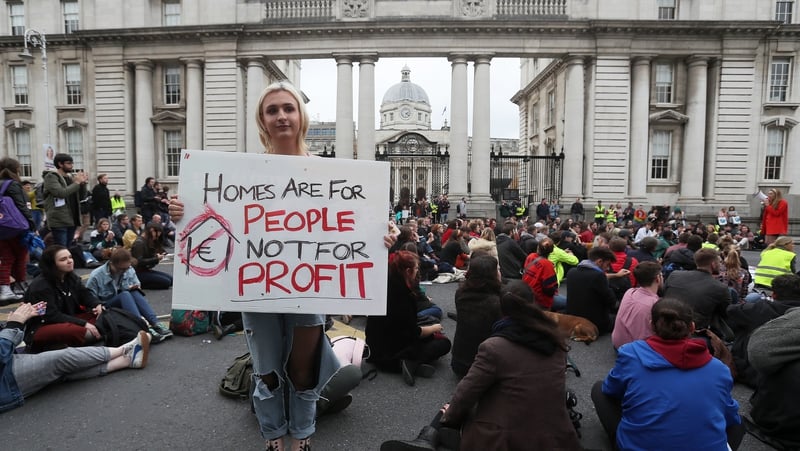Opinion: housing activists and advocates have been pushing to redress the current crisis in Ireland and achieve a more equitable system
Ireland's housing system did not become dysfunctional by accident. The current housing crisis plaguing the country, and dominating most current political conversations, is the result of decisions made by governments and policymakers that see housing as a commodity. This has spearheaded a structural shift, in which major financial investors transform housing into an arena of financial speculation.
While the financialisation of housing and housing inequality is not exclusive to this country, it is currently one of Ireland's most pressing issues. More than just a fodder for daily conversation, the constant disheartening stories about homelessness, rising rents, increases in house prices, shortage of supply and the general desolation of generation rent cast a gloom on the housing situation.
While the scale of the housing challenge is vast and often presented as a 'wicked problem’, a growing movement of housing activists, community leaders and housing advocates have been pushing to redress the crisis and achieve an equitable housing system. These activists aim to pressure government to act decidedly and effectively by encouraging public debate about housing as a human right.
We need your consent to load this rte-player contentWe use rte-player to manage extra content that can set cookies on your device and collect data about your activity. Please review their details and accept them to load the content.Manage Preferences
From RTÉ Radio 1's Morning Ireland, Hugh Brennan from the Ó Cualann Co-housing Alliance on the massive sale price for a Dublin home built four years ago under the Affordable Housing Scheme
If such reactions exist, how have they emerged and what have they been doing in relation to housing justice? This is the question that drives my recent research on the politics of housing. I look at the current existing housing crisis not only in terms of policy effectiveness and housing inequality, but also the unprecedented wave of movements for housing justice.
The new housing groups that have proliferated in Ireland have been at the forefront of the urban struggle. Organised into local community groups, collectives and coalitions, housing activists are identifying the structures of wealth accumulation for which the housing poverty and homelessness are the most salient consequences.
In general, most movements are organised around a ‘new’ social agenda based on a right to housing and the city. They are concerned about housing justice and come together to demand major changes in housing policy, while challenging the lack of rights of the homeless and migrants, poor homeless services, weak tenancy laws and the puny regulation around vacant properties. Importantly, they have been mobilising policy mechanisms in favour of the social function of properties and the decommodification of housing. This is based on the assumption that decent housing is a human right and should not be left to the free market.
We need your consent to load this rte-player contentWe use rte-player to manage extra content that can set cookies on your device and collect data about your activity. Please review their details and accept them to load the content.Manage Preferences
From RTÉ Archives, RTÉ News report on housing protests in Dublin in 1969 organised by the Dublin Housing Action Committee
However, housing mobilisations are not necessarily new here. Ireland has had an important degree of grassroots, working-class, self-organisation for years in the form of community-based activism. The Dublin Housing Action Committee of the 1960s is usually identified as one of the first organised movements for housing rights in the capital, followed by the National Association of Tenants' Organisations.
In the 1980s and 1990s, the ‘social partnerships’ demobilised and professionalised local communities organising, which de-politicised and co-opted community activism. It was the anti-austerity movements that awakened the dormant popular forces and spurred on the Right2water campaign in 2013. At the same time, new Irish housing movements began to emerge, as the initial period of the crisis gave way to a new housing and homeless crisis from 2014.
We need your consent to load this rte-player contentWe use rte-player to manage extra content that can set cookies on your device and collect data about your activity. Please review their details and accept them to load the content.Manage Preferences
From RTÉ Six One News, thousands marched on Leinster House in a housing protest organised by Raise the Roof in October 2018
New conditions mean new forms of organisation. Housing activists launched campaigns to demand the right to housing in the constitution, built alliances, combined various resources, developed political strategies, mobilised in person and on social media and mounted protest campaigns with varying degrees of success. Its participants range from local community activists with a progressive agenda and elected politicians in left and centre parties to charities, housing advocates, trade unions and more radical left-leaning individuals.
Though from different backgrounds, activists join local grassroots groups, coalitions and collectives. The more publicly visible to date have included Raise The Roof, Take Back The City, the Home Sweet Home occupation of Apollo House and more recently, the tenant organisation Community Action Tenants Union (CATU).
We need your consent to load this rte-player contentWe use rte-player to manage extra content that can set cookies on your device and collect data about your activity. Please review their details and accept them to load the content.Manage Preferences
From RTÉ One's Claire Byrne Live, members of Take Back The City discuss their protest against the housing crisis in September 2018
These movements differ in their strategies. Take Back The City and Home Sweet Home deployed direct action to challenge real estate market speculation, connecting activists with different backgrounds to call for a better use of vacant buildings. Raise The Roof promotes the right to housing via mass campaigns and institutional activism, adopting a less conflicting action repertoire. CATU uses tenant community organisation and direct action to stop evictions and protect renters rights as a larger part of its activities.
It is also important to note the contribution of scholar-activists to the housing justice movement. They use the insights, data and experiences gained from housing research to inform new policies and future political action, but also are publicly committed to the emancipatory potential of housing mobilisation.
We need your consent to load this comcast-player contentWe use comcast-player to manage extra content that can set cookies on your device and collect data about your activity. Please review their details and accept them to load the content.Manage Preferences
From RTÉ Brainstorm, how long-term renting is impacting on our mental health
All of the above movements were born out of the need to organise amidst a deep housing crisis, which has displaced the most vulnerable and generated an increasing number of family homelessness. Housing justice movements are needed more than ever to keep the government accountable and push for inclusive, accessible and affordable housing. Current policymaking mechanisms in Ireland gives little voice to vulnerable groups and it seems that housing policy here is dictated by powerful real estate lobbyists (some people call it 'corporatocracy').
Consultation mechanisms do exist in the formulation of Irish public policies, but it is not clear whether citizens' contributions are incorporated into the final product. When citizens do not participate in meaningful policy making, the results often lead to further lack of confidence and low trust in the political system.
It's easy for critics to dismiss the achievements of the housing movements and point out the many things they have not been able to do. However, success in social movements is not exactly black and white and many elements need to be considered before we talk about success or failure. Success depends on the activists' point of view and goals, and the results of social movements depend on the political context.
We need your consent to load this rte-player contentWe use rte-player to manage extra content that can set cookies on your device and collect data about your activity. Please review their details and accept them to load the content.Manage Preferences
From RTÉ Radio 1's Drivetime, John Mark McCafferty (Threshold) and Margaret McCormack (Irish Property Owners' Association) discuss rent hikes
Housing organisers are notable for what they have achieved: bridging the gap between different groups and communities, challenging the deep-pocket real estate investors lobby, pushing for structural housing changes, winning the temporary but meaningful eviction and rent increase moratorium, and most importantly, bringing the debate around housing rights to new audiences. People in Ireland now understand more about the crisis, about who is to blame and alternative solutions and openly discuss eviction bans and rent controls. As imperfect as they are, housing movements have brought their bold visions of a better housing future to the general public.
Ultimately, the pandemic has exacerbated housing precarity. It has made housing activism even more significant, and challenged housing activists to innovate and survive in uncertain times. The challenge of the various Irish housing movements and activists is to consolidate at a mass level around housing solutions that can tackle the housing crisis.
The views expressed here are those of the author and do not represent or reflect the views of RTÉ



